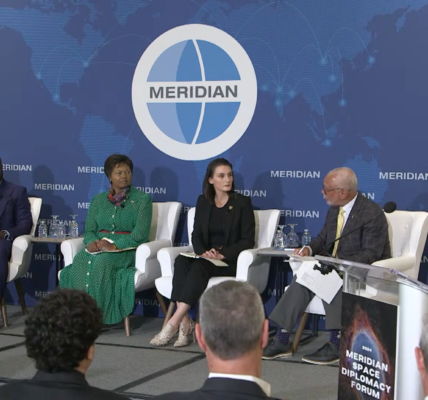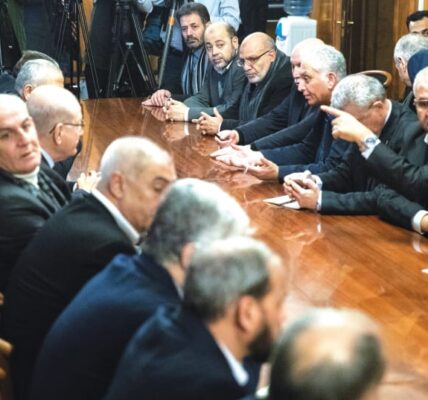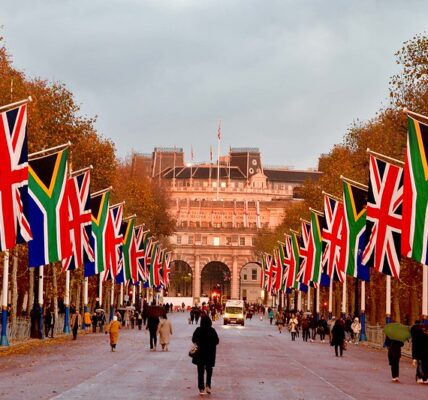South African President Ramaphosa Denies Taking Sides in Gaza War, As His Foreign Minister Accuses Israel of Defying ICJ ruling
South African President Cyril Ramaphosa has refuted claims that South Africa is taking sides in the Gaza war and that relations with the United States have soured due to the International Court of Justice case against Israel.
The South African Government hauled Israel to the ICJ and alleged genocide in its action against Hamas for the October 7 attack, a move which has drawn widespread criticism from Western leaders. The ICJ issued a ruling at the end of January ordering Israel to “take all measures within its power” to prevent acts of genocide as it wages war against Hamas militants in the Gaza Strip. South Africa has launched a second application seeking additional measures to protect 2.3 million Palestinians in Gaza and to prevent Israel from “continuing egregious breaches” of the provisional measures that the ICJ handed down in January claiming that it was necessitated by the situation in Gaza.
In a letter to the South African nation, Mr Ramaphosa writes that he wanted to “correct misperceptions about our foreign policy.” He characterised his relationship with the US as one of “mutual respect and a willingness to engage in constructive dialogue even on issues where we may differ.” South Africa application to the court, he said,” is consistent not only with our obligations as a signatory to the Genocide Convention, but also the call we have always made for an inclusive negotiated settlement of the Israel-Palestinian conflict. This position is consistent with UN resolutions,” he said.
President Ramaphosa stated that the suggestion that South Africa’s stance on the conflict could harm relations with the US is “therefore unfounded.” He acknowledged the support of the US in the fight against HIV/Aids, the African Growth and Opportunity Act (AGOA) and the Just Energy Partnership and said there was great opportunity to further develop this relationship and “to work together for a more peaceful, stable and just world.”
Over the past week, South Africa’s Minister of International Relations, Naledi Pandor, was on a working visit to the United States and Jamaica. The Minister conceded that the relationship with the Biden Administration could be scored as “six out of ten” and acknowledged that the score would be even lower for Congress and the Senate. “The executive,” she said, “has a close understanding of South Africa, and I’m not sure that the legislators have a similar understanding.” During a media briefing at the South African embassy in Washington, she characterised the efforts to impose punitive measures against South Africa and include it in a new “Axis of Evil” as a reflection of Washington’s political culture.
She was referring to a bipartisan bill that was introduced by US Republican Congressman John James and Democratic Party Congressman Jared Moskowitz, calling for a full review of the country’s bilateral relationship with South Africa following the ICJ ruling. It reads, ‘Following Hamas’ unprovoked and unprecedented horrendous attack on Israel on October 7, 2023, during which Hamas terrorists killed and kidnapped hundreds of Israelis, members of the South African Government and leaders of the ANC have delivered a variety of antisemitic and anti-Israel-related statements and actions.’
Minister Pandor stated that Members of Congress “make conclusions about South Africa’s international relations without necessarily speaking to us.” She expressed that if she were to make a “definitive statement about a country and its policy, I would at least speak to its policymakers first and attempt to understand what the cause, if any, of an emerging dissonance might be.” Pandor mentioned that the bill has not been tabled yet and suggested it might be an attempt to “rattle” the South African government, but added, “we’re not easily rattled.
Speaking at a fireside chat at the Carnegie Endowment for International Peace, Pandor accused Israel of entirely ignoring the provisional measures of the ICJ ruling. She added that these measures have not been acted upon. Pandor said “we’re seeing mass starvation now and famine before our very eyes.” She said what South Africa did was merely practising the rights that have been preached to Africa.
“We have been educated to uphold international law and democracy.” For South Africa, she said, the International Court of Justice is the institution with the remit to address this issue. “Now it has been ignored,” she said. The Minister added that Israel’s actions may mean other nations believe that “there’s licence – I can do what I want and I will not be stopped.”
One of the key issues for South Africa is to continue its participation in AGOA. This preferential trade programme provides 32 African countries with duty-free access to the US market. If the US decides to terminate AGOA, the decision to extend the programme beyond 2025 will rest with Congress.
The Brookings Institution has estimated that although the impact of a loss of AGOA on exports and gross domestic product would be small with total exports to the US falling by about 2.7%, some sectors like the food and beverages sector could drop by around 16%. GDP decline would be just 0.06%. They however acknowledge that this model does not include the potential loss of investment and market confidence.
While South Africa diplomats have indicated that they wanted to limit the damage to its relations with Washington caused by the country’s legal challenges to Israel Minister Pandor did not appear to secure meetings with key decision-makers in Washington. She indicated that she had not sought meetings with President Joe Biden or Secretary of State Anthony Blinken during her Washington visit.
The official opposition in Parliament, the Democratic Alliance has described Pandor’s visit to Washington as an “entirely useless exercise until such time as the ANC government begins acting with consistency and in line with our country’s hard-won Constitutional values.” DA Shadow Minister of International Relations and Cooperation Emma Powell told NSN that the problem is, the ANC can’t [act consistently].They’ve got an election campaign to run and that requires financial resources,” she said.
“Despite spending millions on litigation at the ICJ under the auspices of defending the human rights of civilians, they’ve refused to condemn Russia’s illegal invasion of Ukraine, whilst ANC leaders openly fraternise with their friends at the Kremlin. For instance, the ANC Secretary General, Fikile Mbalula, and ANC National Executive member, Lindiwe Zulu were in Moscow the same weekend as Russian opposition leader Alexei Navalny was murdered – a tragedy the ANC remained entirely silent about,” she said.
Powell said the ANC government of Pandor practises non-alignment where it suits them. ‘Despite spending millions on litigation at the ICJ under the auspices of defending the human rights of civilians,” she said, “they’ve refused to condemn Russia’s illegal invasion of Ukraine, whilst ANC leaders openly fraternise with their friends at the Kremlin.”
Furthermore, she accused them of turning a blind eye to the bloodbath unfolding in Sudan and said they have openly blamed the crisis in Zimbabwe on Western sanctions, instead of condemning ZANU-PF’s 30-year reign of terror, “which has turned the breadbasket of Africa into a begging bowl.”
The DA has also questioned the source of ANC-funding and said it was protecting its “real benefactors.” Powell mentioned that the ANC was unable to pay their bills and assets were attached at Luthuli House, but their financial situation was “miraculously” resolved, and “we know they’re getting income from actors in the axis of evil and that the ANC’s political funding streams are dictating its foreign policy positions in government.”
Clayson Monyela, spokesperson for Minister Pandor, said that she had productive interactions with US legislators from both the Democratic and Republican parties during their visit. He shared on X, previously known as Twitter, that the minister’s dialogues were “extremely positive and fruitful… Two vigorous and vocal democracies that appreciate their mutually advantageous relationship.”


































































































































































































































































































